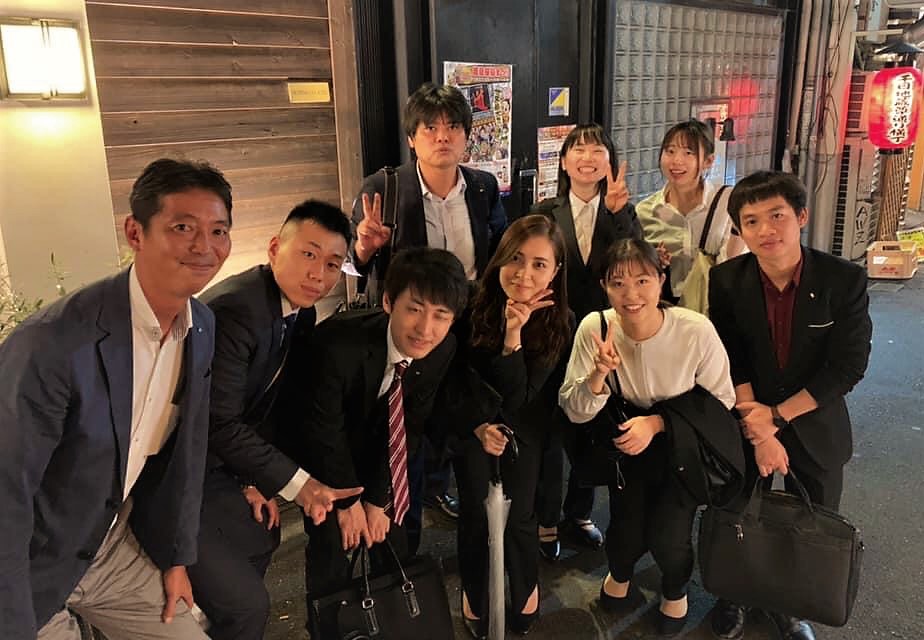A Story of an International Student #2: Overcoming Job Hunting and Enjoying Working Life
Ms. Huỳnh Thị Thảo Nhi
Born in 1995 in Vietnam
2013: Entered foreign language university
2016: Entered Japanese language school (Osaka)
2017: Graduated from foreign language university
2018: Entered vocational school (Osaka)
2019: Started working at a company
Plan to Study in Japan for 2 Years
 Yakiniku with friends from Japanese language school(October, 2017)
Yakiniku with friends from Japanese language school(October, 2017)When I was in my third year of university, I entered a Japanese language school in Osaka as part of a study abroad program that was approved for academic credit. At first, I planned to return home after two years, but after living in Japan, I fell in love with the country and wanted to find a job.
So, I entered a vocational school in my third year in Japan. Vocational schools usually take two years to complete, but I found a dual business course that only takes one year to complete. I could have transferred to a Japanese university from the third year, but since I had graduated from my home university during my stay in Japan, I chose the one that would allow me to find a job quickly.
Job Hunting
As soon as I entered school, Shukatsu (job hunting) began. That school hosts job fairs at their own campuses and also introduces internship sites. I interned at two companies, working three times a week for one or two months each.
There were several times when I was rejected in interviews, but I thought about the reasons for my failures and corrected them. Then, when I figured out who I was and continued my job hunting with confidence, I received job offers from several companies. Eventually, I decided to work for one of my internship sites.
Job Hunting Schedule for International Students
How can international students find jobs in Japan? Looking for a job in Japan is called Shukatsu (job hunting). Some schools explain that job hunting starts in April, but many students start preparing before that. Here is the schedule of job hunting.
The Cost of Studying in Japan
 Spending holidays with friends from my hometown(2019)
Spending holidays with friends from my hometown(2019)The initial amount of money I spent to study in Japan was about 1 million JPY, which consisted of the following.
- Tuition and entrance fee for one year: 700,000 JPY
- Rent for 6 months: 120,000 JPY
- Airfare: 60,000 JPY
- Futons, textbooks, etc.: 100,000 JPY
My part-time job alone was not enough to cover my tuition and living expenses, so after that, my mother sent me more money. After I found a job, I started to send back money to my mother.
What are the Costs and Income of International Students in Japan?
Costs and Income while Studying in Japan Do you know that it is difficult to earn money for living expenses and tuitions while studying in Japan by only working part-time? This section will give you an idea of how much it costs to live in Japan and how much you can earn by working part-time.
Learning Japanese and Working Part-Time
 Bowling with friends from part-time job(November, 2016)
Bowling with friends from part-time job(November, 2016)I obtained JLPT (Japanese Language Proficiency Test) N3 before I came to Japan, and after I came to Japan, I studied for two to three hours every day outside of class (three or four hours on days when I did not have a part-time job).
I also worked part-time at a convenience store and an izakaya (Japanese pub), where I talked a lot with my Japanese colleagues and customers. I was able to use the phrases I learned in my studies in actual situations, and my conversation skills improved. I was able to do this kind of work from the very beginning because I came to Japan after developing my basic Japanese language skills.
Part-time Job and Immigration Control Act
If you are an international student working part-time in Japan, there is a rule that you can work up to 28 hours per week. However, there are other important things to know in addition to this ‟28 hours per week” rule. Let’s take a look at regulations on part-time work.
About My Job
 Drinking with colleagues(2019)
Drinking with colleagues(2019)I love my current workplace. I am the only Vietnamese person at the Osaka head office, but everyone is very kind. For example, when I first started working, after someone explained something in a meeting, they asked me if I understood, or asked me if I had any problems in my daily life.
Other than translation, my work is the same as that of Japanese colleagues, including hiring, work management, equipment management, and answering phones. If our company expands to Vietnam in the future, I hope to be involved in that project.
A Story of an International Student #1: “Obtained N2 and Directly Entered University”
If you obtain JLPT (Japanese Language Proficiency Test) N2 or higher in your home country, you can apply to Japanese universities without having to study at a Japanese language school. Here is Ms. Han’s story of how she did so and started studying at a university in Japan.
A Story of an International Student #3: Interacting with Many Japanese People While Studying in Japan
This is Ms. Minh’s story of how her Japanese language skills improved after interacting with many Japanese friends during her study in Japan. Ms. Minh got a job in Japan after her study, so we will also share her job-hunting experiences.
Working in Japan – Pay, Overtime Pay and Paid Leave
This article tells you how salaries are calculated for foreigners working in Japan.. It also explains the overtime pay and paid leave systems.
If you want to know more, check here!
Job Hunting Guide for International Students | JASSO
Employment Service for foreigners | Ministry of Health, Labour and Welfare
